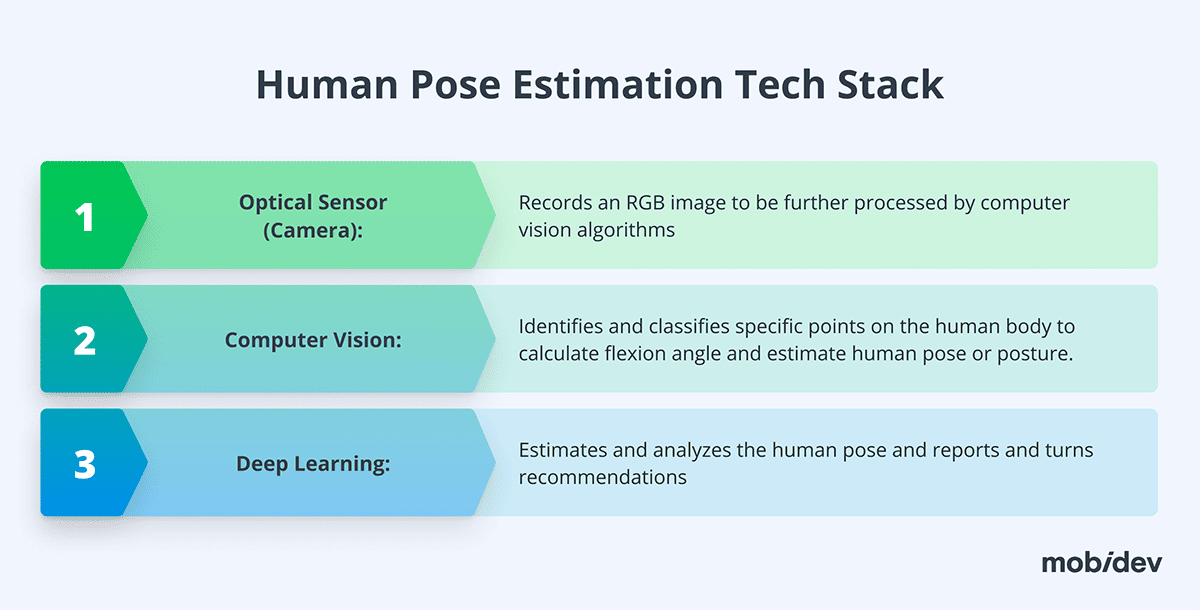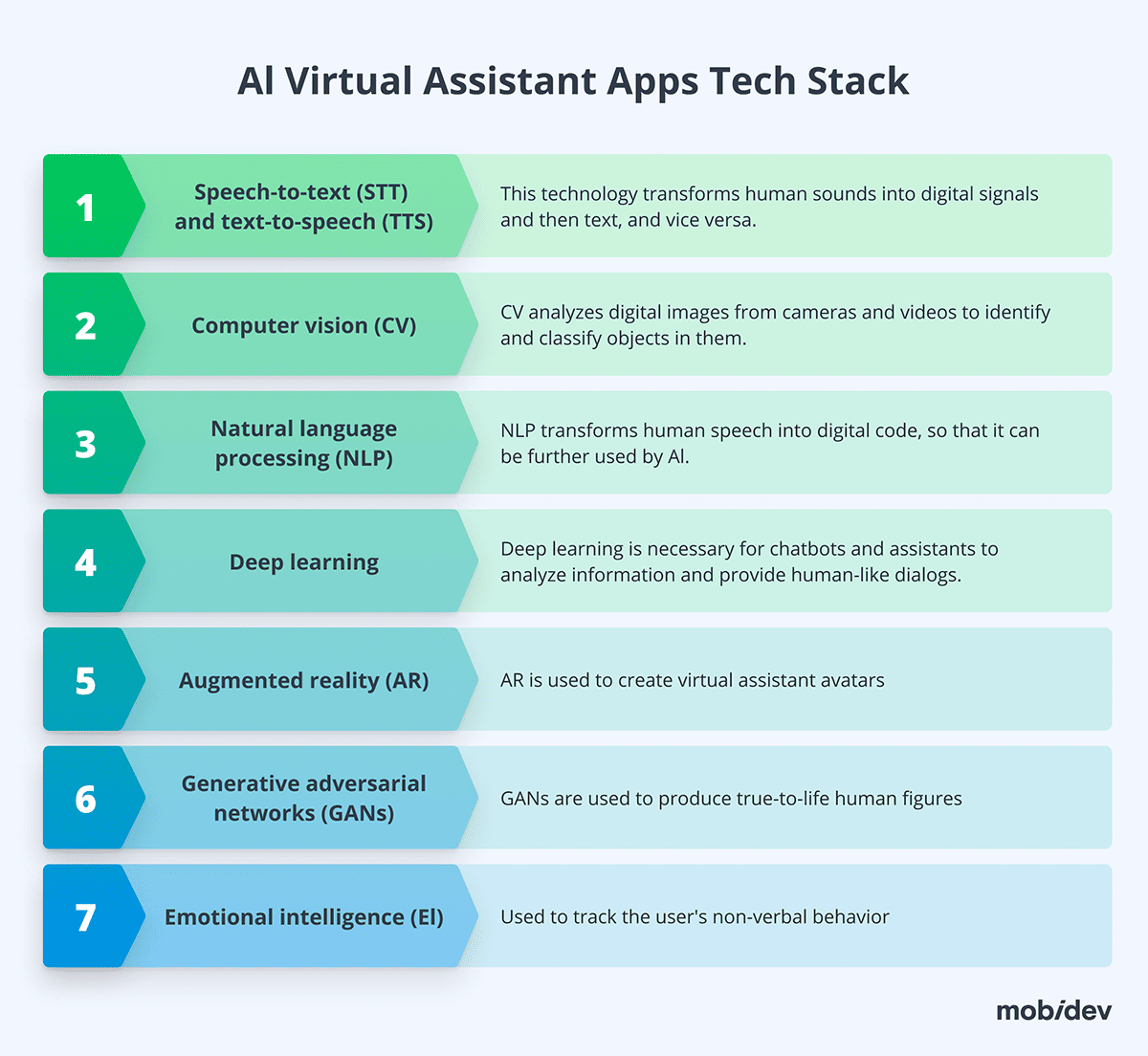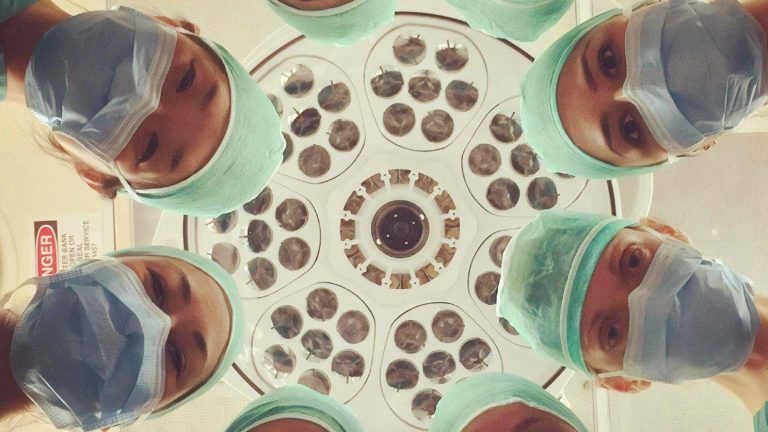Contents:
We are witnessing the dawn of AI in the healthcare industry, meaning that any product can revolutionize the niche and set the trends for tomorrow.
Whether you want to build a healthcare solution from scratch or integrate AI into your existing medical system, it’s the right time to step in, as currently, the market is set to grow at 38.5% a year. A recent study from Microsoft-IDC showed that every US dollar invested in AI has the potential to generate $3.2 within 14 months.
Yet, the profitability of AI in healthcare depends greatly on professionalism and knowledge of market specifics. MobiDev has extensive experience in AI consulting and building software products for the healthcare industry, and we are ready to cast light on this domain. In this article, we’ll share some practical cases of AI in healthcare and provide the best advice for how to build similar products for your business.
Top 5 key Benefits of Using AI Technology in Healthcare
From cost reduction to providing doctors with the means to detect potential health issues early, the implementation of AI in healthcare shifts the paradigm of today’s medical services. The most obvious benefits of AI in healthcare are as follows:
1. Cost reduction
Thanks to its ability to spot hidden patterns in large sets of data, AI allows healthcare entities to optimize operations and cut costs. In healthcare, the cost-saving potential of AI may be used everywhere:
In supply management: by analyzing patient inflow and usage data, AI tools forecast the need for medical supplies to help hospitals maintain optimal stock levels and reduce wastage.
In preventive care: detecting diseases early and preventing their further development helps cut costs related to expensive treatment in the future. For example, fitness trackers, paired with AI-based apps, trace patterns in blood pressure and pulse to detect anomalies and suggest visiting a doctor in advance of a health-based emergency. In the same way, Continuous Glucose Monitoring Systems (CGMs), consisting of an attachable sensor and an AI-powered app, help to regulate insulin intake in a smarter way, helping patients to avoid unnecessary shots.
In routine optimization: Modern-era AI assistants (examples include the San Francisco-based product Suki or Singapore built BotMD) can take notes after a doctor’s words, decipher recordings or videos, check-up schedules, organize information into files, and manage appointments. Physicians take, on average, two hours to do work at their desks, but tools like those mentioned above can reduce paper use.
In resource allocation: by analyzing patient admissions, hospital capacities, and staff availability, AI helps utilize facilities and medical staff in the most optimal way, and using this data creates results. For example, Steward Healthcare, a large hospital chain in the US, used Microsoft AI to predict how long patients would stay in a hospital and adjusted resources accordingly. This initiative helped them save $48 million USD a year.
2. Improved decision-making
In the US, most physicians spend, on average, 15 minutes with their patients per visit, which is not always enough to collect a balanced picture of the patient’s state. Skipping over the collection of the entirety of a patient’s complaints is a real pain point in modern medicine, which can be solved by implementing AI in healthcare. Because they can process medical history 100x faster than a human (e.g., an AI tool from HiLabs), AI tools can assist doctors with findings from years of medical records, thus helping with more accurate data-based decisions. Also, data from a patient’s medical histories can help insurance companies assess possible risks and assign insurance plans and fees accordingly.
3. Improved efficiency and accuracy
Medical billing is one of the most burdensome tasks for medical personnel. It is also time-consuming, prone to errors, and expensive, as some companies hire third-party services for claims handling.
AI solutions automate the procedures for medical billing. For example, the Japanese insurance company Fukoku Mutual Life Insurance, uses IBM’s Watson to classify medical manipulations and then automatically close payout claims, which allows for more accurate outputs compared to human labor.
4. Improved Patient Experience
AI applications in healthcare have the potential to improve patient experience during different parts of their journey. It can help patients find a free spot in a doctor’s busy schedule, call patients after discharge, follow up with appointment reminders, check up with them during recovery to remind them to take necessary medications and to ensure that the prescribed medications are correctly influencing the patient’s well-being.
An interesting product in this area is Hippocratic AI. Instead of waiting for a medical procedure in an overcrowded hospital ward, a user of Hippocratic AI may expect a call from an AI assistant, like Ana, who will check on their wellbeing, mail them an at-home test, and schedule an appointment after the lab results are ready. Besides avoiding a time-consuming hospital visit, a patient can also select a preferred language, which improves care for the entire healthcare population who work with a doctor or hospital system.
5. Time-saving
A whopping 46% of adults worldwide consider long waiting times the biggest problem of the healthcare systems in their country. Another 46% say they suffer from the lack of hospital staff. Considering optimizations provided by AI, these long waiting queues may be eliminated considerably. Here’s how AI in healthcare contributes to time savings:
- Administrative AI applications make smarter schedules (Suki, BotMD)
- AI bots speed up preparations for medical procedures (Hippocratic AI)
- Some AI tools are able to analyze scans detecting whether patients have critical conditions, like brain injuries or lung pathologies(Viz LVO, Mayo Clinic AI tool)
- Decision-making takes less time thanks to AI tools that process the medical history of patients 100 times faster than human doctors (HiLabs AI tool)
Cutting down routine tasks also increases the time doctors spend with patients. A recent survey shows that the implementation of AI in healthcare expands a doctor’s time with patients by 17%.
This is a bird’s-eye view of the benefits of AI in healthcare, but it makes it clear the implantation of AI has huge potential when it comes to moving your healthcare business forward.
Let’s review TOP 5 examples of how AI is used in practice in healthcare and what knowledge you need to implement it in your business.
Use case #1: Using AI for Healthcare Document Management
Tons of hospital documents stored on paper hold precious insights on finance, patient highs and lows, equipment lifetime, or overall staff productivity. AI document processing helps unearth this information. For example, you can extract all the finance documents on hospital beds and sort them by year, provider, or price. You can also sort out insurance data to see how many patients you accept from each insurance provider.
The only thing that separates a business owner from valuable AI insights is the quality of the data.
Usually, a hospital’s documentation comes in an amalgamation of printed forms, handwritten notes, PDFs, e-mails, and video and audio records. The task is to organize this data to be used by AI to uncover trends. This is possible thanks to optical character recognition (OCR) and natural language processing (NLP).
Optical character recognition is a combination of a scanner and a machine learning algorithm that transforms printed, typed, and handwritten texts, as well as images like logos and stamps, into digital format. Usually trained on huge amounts of data (an ML algorithm that recognizes handwriting was trained on 60,000 handwritten images from 0 to 9), OCR provides an accurate copy of documents that are going to go for further AI jobs, like natural language processing.
Natural language processing refers to machine learning models able to recognize the grammar and semantics of the text or to “translate” human message for a computer to “understand”, and then classify, validate, and recognize different entities in data (like patient names or addresses). It will then improve the data’s quality and analyze.
You can process all sorts of hospital documentation this way, like utility bills, driver’s licenses, lease agreements, court documents, tax forms, and healthcare records – everything you might need to gain insights from.
The documents get pre-prepared. For scanned documents, the image angle is normalized, and defects, like light spots or scanner defects, get removed. In the next stage, we bring all the data to some common format, label it, remove overlays. Sometimes, data is corrupted. AI helps validate this information as well. Finally, the data, structured in a suitable format, is used for insights and analytics.
Here’s a practical example from MobiDev’s experience: Our client, operating in the US healthcare sector, faced issues comparing medical cases from different sources, as the data sources were structured differently. A solution from MobiDev synchronized data and normalized batches of data so that the information could be searched. It made it possible to find specific medical cases with ease.
This is just one example of the almost unlimited possibilities of innovations in healthcare that allow unimaginable manipulations with the use of documentation.

For more details, read our article:
Healthcare App Development Guide: Software Ecosystem, Features, Regulations, and CostsUse case #2. Diagnosis and Prevention of Diseases With AI
The application of AI in diagnostics started with radiology and then transferred to cardiac diseases and pathology. Now, AI-based diagnostics embrace almost every branch of medicine, from diagnosing diabetes or predicting cardiac diseases by analyzing blood samples, to establishing the risk of genetic diseases by analyzing family medical history.
But let’s review one of the most profound applications of AI in healthcare: scan analysis.
As some of the earliest AI applications in healthcare, scan analysis technologies provide some of the most promising results. For example, recently, a team of US, French, and German researchers trained an ML algorithm on 100,000 skin cancer images to identify anomalies. In the outcome, the algorithm was performed in pairs with 58 prominent dermatologists.
However, in cases like this, it is important to remember that every instance is unique. In fact, 60% of medical practitioners, though enthusiastic about AI in healthcare in general, are concerned about unpredictable, incorrect results.
Therefore, the best solution would be to use AI to streamline observation and analytics while leaving key decision-making in the hands of a doctor. This was the aim of MobiDev’s WSI solution.
Upon the request of our client, we have developed a tool to help diagnose cancer from whole slide images (WSI). Working with WSIs is extremely difficult because of the large resolution of these scans. To conduct examinations, doctors have to manually review large-format scans. Using computer vision, AI identifies cancer cells and spotlights scan areas where these may be located. Thus, doctors review the risk areas in the first place while also skipping routine examinations of clear areas of the scan. This makes diagnosis faster, which is important for early detection of the disease in the initial stage of development.
Another noteworthy case is AI dementia diagnosis with the help of natural language processing.
Dementia and some other mental disorders can be tested through speech analysis. Yet early markers of the disease are still difficult to spot and require a high level of medical training, which is not available to all of the at-risk groups.
Research done by MobiDev aimed at AI dementia diagnosis allows for the tracking of early markers of disease from patient recordings.
The algorithm was trained on over 552 recordings of dementia patients and healthy people performing the Cookie Theft test describing an event depicted on an image. After transforming speech into text, we extracted high-level speech representations to classify them. The experiment proved a high level of accuracy in detecting the early signs of dementia, which has potential for use in medical establishments.
Have a game-changing AI product idea?
Turn it into a feasible software product you can build with confidence
AI Healthcare ConsultingUse case #3. Computer Vision for Rehabilitation Solutions
Human pose estimation (HPE) is a computer vision technology that identifies and tracks specific points of the human body. The changes in human pose can predict the overall health decay, so it’s extremely important to detect these changes early. This technology can also be used in physical rehabilitation, fitness, and virtual fitting rooms.
A typical human pose estimation (HPE) model analyzes an RGB image of a human taken by a scanner or a usual smartphone camera, and detects key body parts and their position as a person moves in the 3D space. Further, a deep learning algorithm like Open Pose, Deep Pose, or DeepCut, evaluates the overall position of the detected points and provides recommendations for improvement.
Human pose estimation helps to track recovery and improvement after an injury or alert regarding dangerous practices. In terms of fitness and training, it helps to transfer the best practices used for training world-class sportsmen to other athletes. For example, MobiDev’s client, BeONE Sports, spots specific patterns in video recordings of athletes and provides them with analytics of their performance, including tips for improvement. This solution provides everyone with world-class coaching advice.
This way, the best physical rehab practices become available to large audiences that are interested in physical improvement but do not have access to individual high-league coaching. This offers impressive monetization opportunities for such a product, and what is more interesting is that AI continues to develop offering scaling opportunities.
Use case #4. Virtual Healthcare Assistants
Virtual healthcare assistants can tackle all sorts of patient services, from scheduling appointments to diagnostics.
The aim is to provide services that don’t require a doctor’s involvement (like answering routine questions) 24/7 to a wider number of patients.
Virtual assistants include chatbots, voice assistants, and AI avatars. They can be generalized, but more complex variants are usually domain-specific. For example, the company Dentviva, offers personalized virtual assistants for dentists.
The type and complexity of a virtual assistant you need determines the technology used to build it, as well as the complexity of the project when you decide to build a custom AI solution.
The technologies used to build virtual assistants are natural language processing for a machine to understand what people type, speech-to-text and text-to-speech for live conversations with assistants, and machine learning. The latter is needed for a chatbot to perform complex tasks like requests for analysis and generating the output.
It is not necessary to train all the ML models for virtual assistants from scratch. Most are based on foundation models like GPT-3 or BERT (pre-trained on general data) and trained additionally on hospital-specific data. Yet, there are cases where the creation of new large language models is needed.
So, the choice of technology depends on the type of product needed.
For example, chatbots, considered to be the simplest kind of AI virtual assistants, are built on the basis of semi-ready solutions provided by open, generative conversational AI platforms like Dialogflow or Rasa. The role of a developer, in this case, is to refine the pre-trained mode on the client’s data.
Specialized AI avatars require way more effort, like designing, animation, text-to-speech and speech-to-text solutions, lip synchronizing, and even specific training on medical-only data from scratch. For example, AI avatars from Hippocratic AI required training large language models specific to medical tasks to achieve productivity that is close to humans. This required tens of millions of dollars in investment from companies like Nvidia and others. As a result, the model was able to perform some complex tasks, such as establishing whether patients take over-the-counter drugs that are not compatible with medications in the doctor’s prescription. It’s one of the most successful examples of conversational AI in healthcare. Compared to Open AI’s ChatGPT, which showed 56% accuracy in this task, Hippocratic AI was 89% effective.
To learn more about how to build virtual assistants of differing complexity, check our AI Virtual Assistant Technology Guide. This article elaborates on the tech stack that will be required for building each type of virtual assistant.
Use case #5. Ensuring Regulatory Compliance With Artificial Intelligence
Privacy and security guidelines require that your medical website or app is safe enough to store sensitive data. Yet regulations like HIPAA, GDPR, and the California Act evolve in real time. Making sure your organization sticks to all of these requirements is burdensome.
AI revolutionizes regulatory compliance, introducing some of the best healthcare data protection strategies, like predictive analytics or real-time anomaly detection. Generally, AI can be helpful in the following ways:
1. Enhanced data management
AI-powered audits, with the help of intelligent document processing algorithms paired with OCR, can analyze vast amounts of data to check if they are compliant with regulations like GDPR or HIPAA.
Also, real-time monitoring can help identify unauthorized access to information in real time and alert for potential breaches.
2. Predictive analytics
By identifying patterns in data, AI can predict violations before they occur and perform risk assessments to provide users with actionable steps to ensure compliance.
3. Natural language processing
Thanks to intelligent document processing, AI automates the review of new regulatory requirements and checks whether the existing hospital documentation is compatible. At the same time, natural language processing tools may be used to identify employee knowledge gaps and provide training and education for the staff.
4. Automated reporting
AI automates compliance reports, ensuring they are submitted on time and contain no human errors.
5. Improving security protocols
AI algorithms detect anomalies in data access patterns, as well as enforce access control, ensuring only authorized staff members access sensitive information.
6. Streamlining processes
AI automates routine compliance checks while saving time and resources on more strategic compliance efforts. It can also integrate with existing systems and enforce their features with AI-powered possibilities.
Yet, it’s important to keep in mind that building a HIPAA-compliant AI solution is a complex task that requires deeper analysis. Check our HIPAA-Compliant Software Development guide to ensure you keep all important information points in focus.

Find more insights on:
HIPAA-Compliant Software DevelopmentThe key 5 Challenges and Ethics of Using AI in Healthcare
The pros and cons of AI in general, and AI in healthcare in particular, have been a topic of hot discussion recently. Like any new technology, especially one that is not completely tested and proven, AI implementation in general, and particularly in healthcare, involves some important concerns:
1. AI bias in healthcare
There is a risk that AI may be trained on biased data that offer preference to certain groups of the population over others. For example, a recent experiment proved that computer-aided diagnosis (CAD) systems return lower accuracy for black patients. As they are inherited from training models, these biases become some of the important cons of AI in healthcare. Imbalanced data also adds to inaccurate results when it comes to model training, as often information about disease-positive patients is more difficult to obtain than info about healthy patients.
2. Erroneous suggestions
The phenomenon called hallucinations, which are present when AI recommends something illogical, is still one of the main risks of AI in healthcare. Not so long ago, a widow in Belgium accused chatbot Eliza of urging her husband to commit suicide, reports Business Insider. This calls for heightened security measures when exposing patients, especially those recovering from mental illnesses, to AI virtual assistants.
3. Informed decision-making
Another disadvantage of AI in healthcare is the heightened pressure on medical staff in terms of explaining to patients how their data will be used by AI. Since AI develops rapidly, the methods of getting informed consent quickly expire and need frequent updates.
4. Ethics of AI In Healthcare
While implementing AI in healthcare, the hospital staff plays the role of a moral judge, ensuring that any solution is introduced in the patient’s best interests. Medical practitioners need to maintain a balance between enhancement initiatives, like implementing AI bots, and patient interests, like presenting a human alternative to those who refuse medical AI.
5. Heightened security risks
AI data theft grows exponentially, and the more organizations implement AI technology in healthcare, the more elaborate security attacks become. Therefore, organizations should pay extra attention to ensuring the security of healthcare apps.
To circumvent these challenges, you need to work with software engineers who build AI products that are fully compliant with privacy and security regulations.
6 Best Practices for Effective AI Implementation in Healthcare
The implementation of AI in healthcare may be technically challenging, yet sticking to the best practices of AI development will help you maximize the benefits. Our team has generalized years of experience in building in healthcare as this list of tips:
1. Follow the consulting approach
Get a clear vision of the final solution, its design, purpose, and the benefits it will bring to your company or clients. This will help you build an effective product and manage your investment wisely.
2. Ensure data quality
Building an effective AI application follows the principle of quality in/quality out. Healthcare data is complex and can come in different formats and from different sources. To ensure you make the most of the data’s potential, the development team should work closely with an experienced data scientist who will clean, preprocess, and structure the data.
3. Establish close collaboration between experts
AI implementation involves people of different crafts: doctors, data scientists, AI engineers, and IT experts. After leaving the lab conditions, the AI system should prove itself productive on the market, which is not always the case. For example, Babylon Health had to close its British division as its initial investment surpassed profits ($402.5 million to $323 million).
4. Keep ethics in focus
Concerns about digital footprint and online privacy started long ago. From the 2009 “right to be forgotten” to the recent EU AI Act, the efforts of internet users to control how their data is used have been growing, and we might safely say that this trend is here to stay. At MobiDev, we use the best industry practices—from encryption protocols to role-based access control—to ensure compliance.
5. Explainable AI (XAI)
AI algorithms often function as black boxes. Yet, for medical practitioners, understanding AI logic is vital. Implementing transparent, explainable models will foster trust between healthcare providers and patients.
6. Integration and scalability
Any AI system should seamlessly integrate with the existing medicine platforms and EHRs to ensure an uninterrupted working process, as any halt in healthcare services is unacceptable. Since AI develops fast as well, the solution should be scalable in the future. Being the experts in AI innovations in healthcare, MobiDev’s AI Consulting services ensure smooth integration and scalability of your apps to evolve with changing technological landscapes.
How MobiDev Can Help you With AI Healthcare App Development
MobiDev will help you take a step forward in implementing your idea of AI in healthcare while ensuring security and compliance.
Since 2009, we’ve been providing flawless services to businesses worldwide, proving our proficiency in a range of niches, including healthcare app development services.
We can build an AI-based healthcare product from scratch or integrate AI into an existing product and, in every case, make sure your app is in line with the latest compliance requirements and the best security practices. Our in-house AI engineers will research your case to offer a custom, unique solution that will best suit your business needs.






